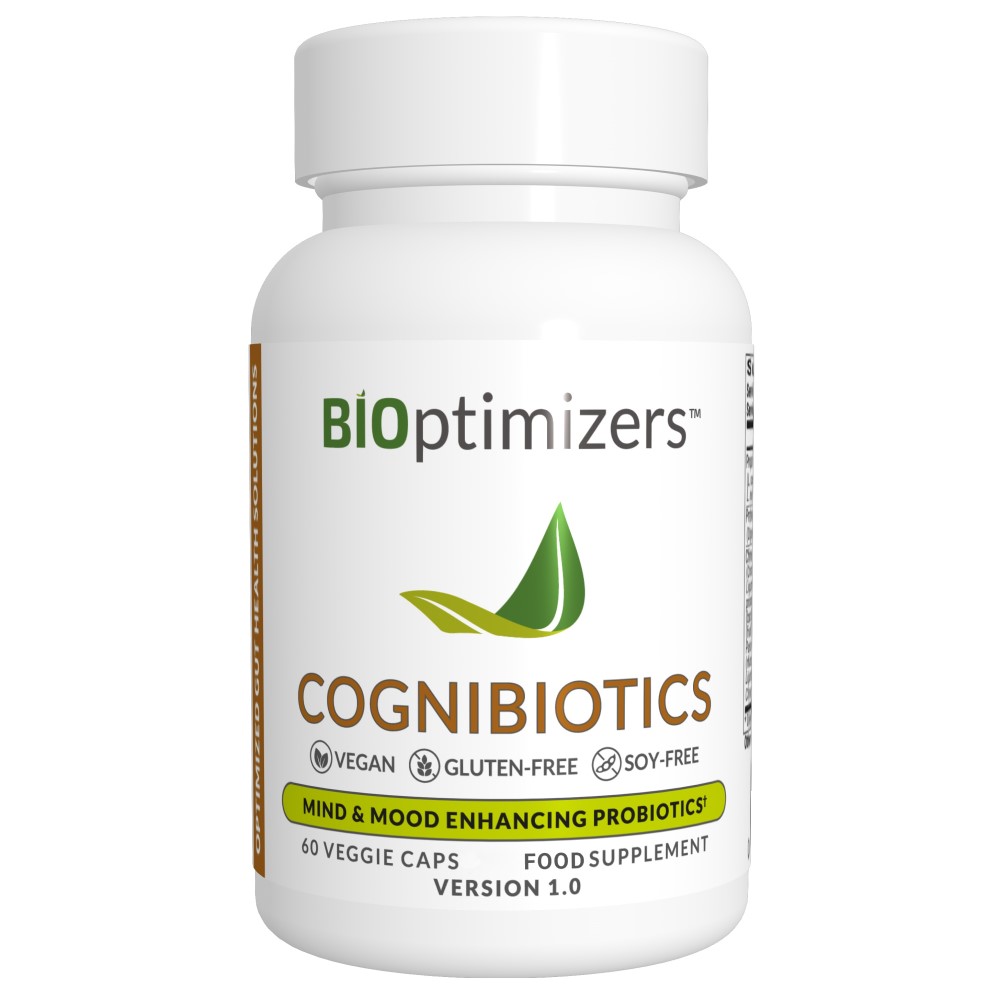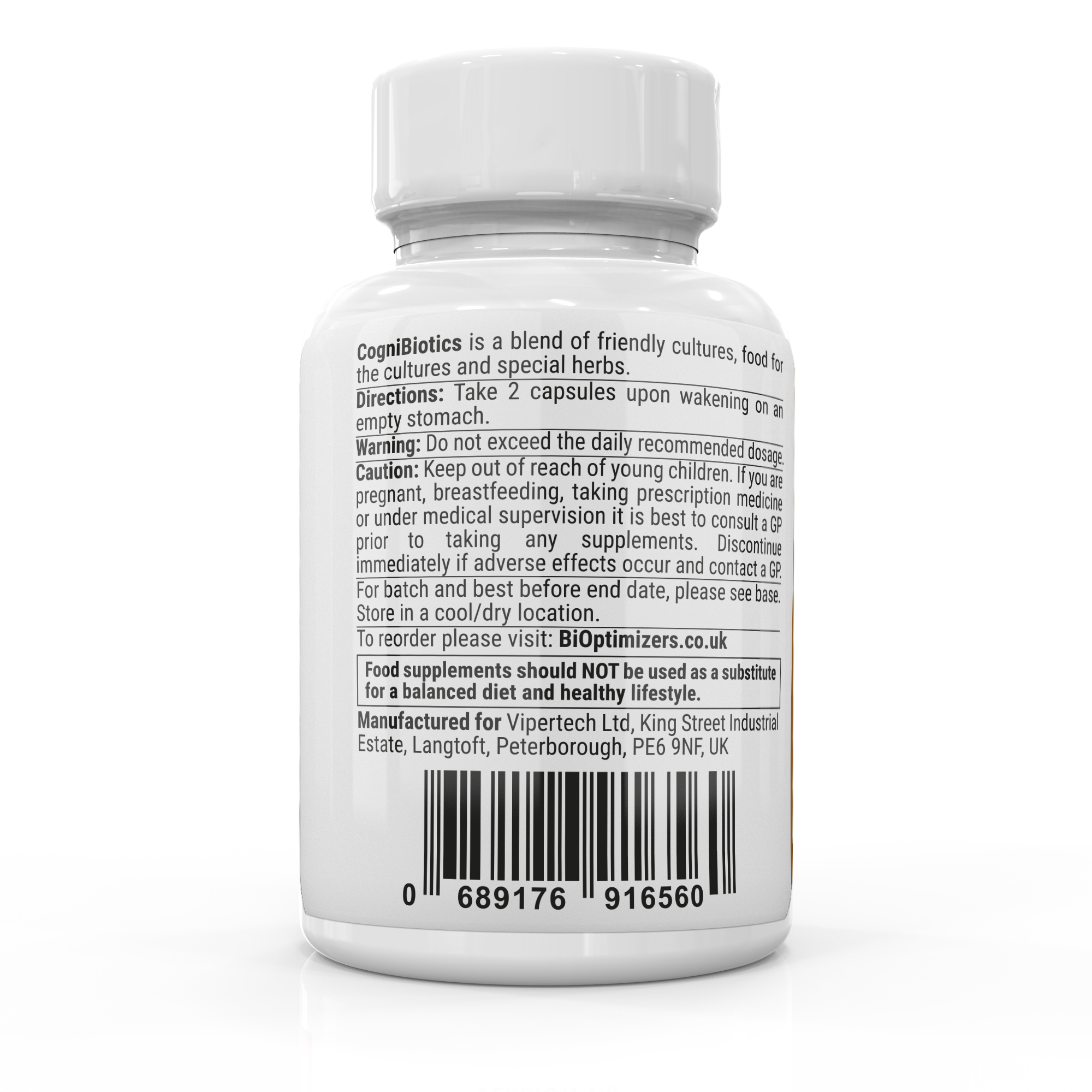BRAIN OPTIMIZATION
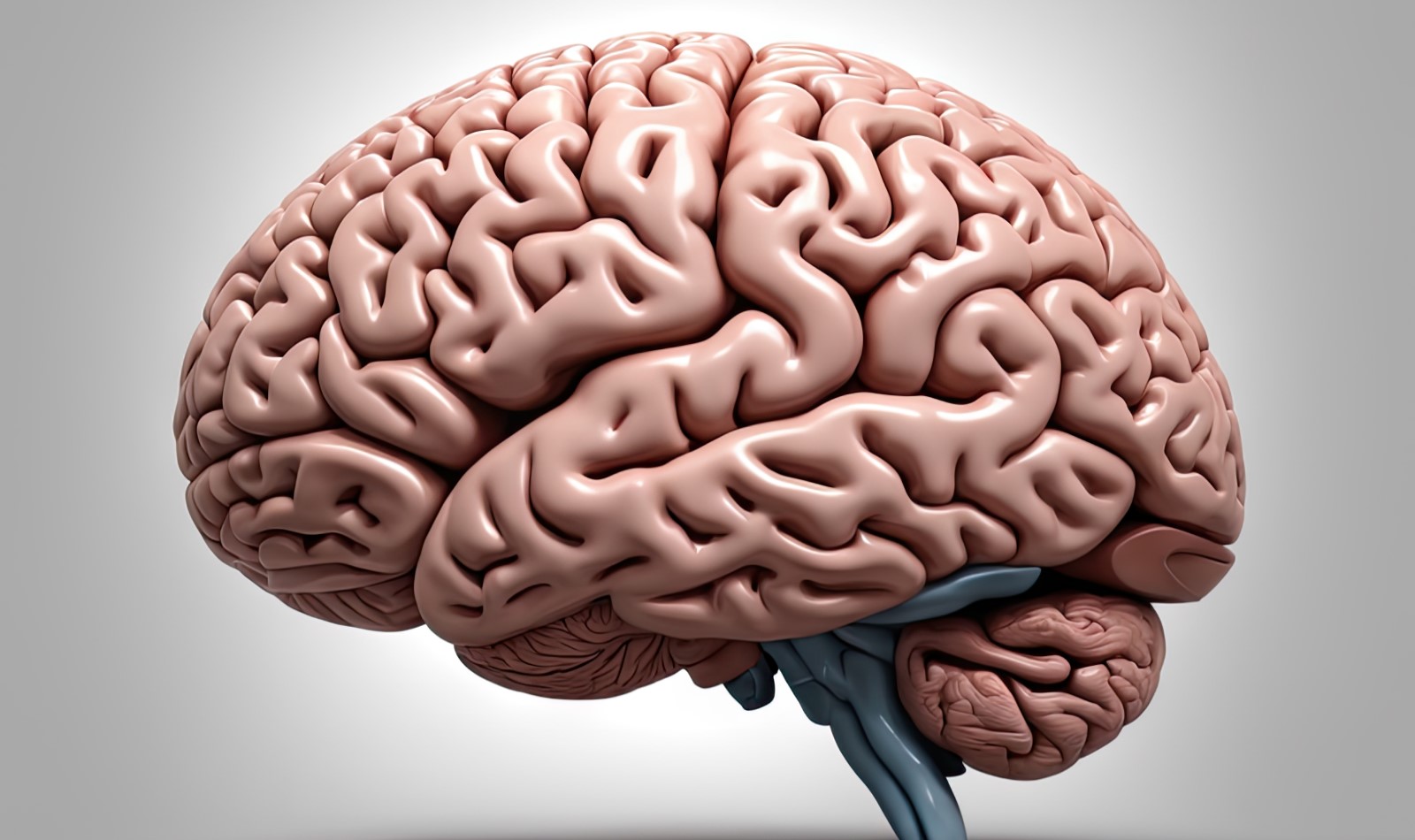
Do you suffer from Brain Fog or Mental Fatigue?
Brain fog and lack of mental clarity can be major obstacles and sources of frustration in our journey to optimal health and peak performance. Whether we want to give our best at work, or simply enjoy the fullness of life, being unable to focus on our goals or the tasks at hand interferes with our ability to be present and achieve success.
7 Science-Proven Ways The Right Brain Supplements Support Brain Health
1. Beating Brain Fog By Optimizing The Gut-Brain-Microbiome Axis

Brain fog, memory issues and difficulty concentrating are easily mistaken with being absent-minded or simply lazy. In reality, they’re more often signs of improper communication between brain cells. Chemicals known as neurotransmitters are responsible for this communication, and the bacteria balance in our gut plays a key role in their production [4].
Research has shown that improving the microbiome composition can be beneficial, even for people with neurological disorders [5]. But please note, Cognibiotics is not a substitute for medical treatment. Consult a physician before beginning any new supplement, diet, training program, or if you’re undergoing treatment of a medical condition.
2. Promotes Learning And Memory

Acetylcholine is an important neurotransmitter for learning and memory.
P. multiflorum, S. miltiorrhiza, and R. glutinosa in Cognibiotics increase acetylcholine levels [7].
Most brain supplements in the market contain ingredients that boost cognitive function, but these probiotics are like having a factory of positive neurochemicals in your own body.
3. Balance Your Stress Response

Studies show [8] the probiotics L. plantarum, L. helveticus, L. fermentum, L. rhamnosus, and B. infantis promote the balance of serotonin, dopamine and GABA in the brain.
Well-balanced neurotransmitters will help to boost and sustain your mood, improve cognitive function, and support you in having a healthy stress response.
4. Helps Your Brain “Stay In Shape”

The brain is an organ. Like other organs, it is strengthened through consistent use and proper nourishment.
The good bacteria [9] and herbs [10] in Cognibiotics work together to stimulate the production of proteins that help the brain grow, reorganize, and adapt. Increasing these proteins helps with learning, memory and mood.
This is why Cognibiotics is one of the best brain health supplements for improving cognitive functions.
5. Helps Your Brain Stand The Test Of Time
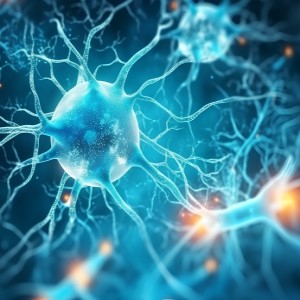
The herbal blends in Cognibiotics also help to protect neurons against oxidative stress.
Oxidative stress is an inevitable part of our daily routine. It comes from mental and emotional stress, environmental toxins, inflammation, unhealthy lifestyle, and more. We rarely consume enough antioxidants in our diets to withstand oxidative stress. This can contribute to brain cell damage, which may lead to brain fog, fatigue, and neurological aging.
Herbs in Cognibiotics contain antioxidants that can cross the blood-brain barrier and protect your brain from day-to-day oxidative stress [11].
6. Increases Blood Flow To The Brain
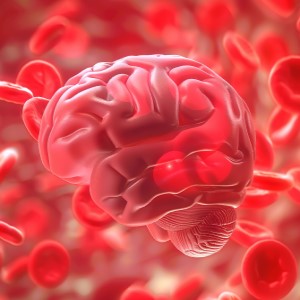
Your brain needs oxygen and vital nutrients to work well. Because it’s located at the highest point in your body and connects to many tiny blood vessels, it’s also the organ that’s hardest to deliver blood to. This reduced blood flow can translate to deprivation of proper oxygen and nutrients. This can cause fatigue, brain fog, poor memory, and low mood.
This reduced blood flow can translate to deprivation of oxygen and nutrients. This can cause fatigue, brain fog, poor cognitive function, and low mood.
The Chaihu-Shugan San herb formula normalizes brain blood flow [12] in patients with depression.
7. Producing Beneficial Substances From Probiotic Metabolism

Among the benefits of probiotics is the generation of beneficial chemicals from their metabolism, “postbiotics”. One of the most well known is butyrate.
Low mood, brain fog, and fatigue [13] are caused by sluggish neurons that can’t produce enough energy (ATP). The small fatty acids like butyrate [14]can enter the brain, energize the sluggish neurons, and lower oxidative stress.
The small fatty acids also counteract chronic inflammation [15] and strengthen the gut and blood-brain barriers [16]. They also promote a healthy metabolism and blood sugar levels which are important for mental alertness.
What Is Brain Fog And How To Treat It?
Brain Fog
Not a medical condition
Brain fog is not a medical condition, but it can be a clinical manifestation of some medical conditions that relate to poor energy production in the brain. This may include:
- Depression
- Anxiety
- ADHD
- Anaemia
- Hypothyroidism
- Alzheimer’s disease
- Autoimmune diseases
- Obesity
- Chronic fatigue syndrome and fibromyalgia
- Infections and post-infection syndrome
Therefore, if you struggle with brain fog, you should see a doctor to rule out these potentially severe issues and get the appropriate treatments, such as taking BiOptimizers supplements for brain fog.
Symptoms
Brain fog is an ambiguous set of symptoms that indicate lagging brain function, such as:[i][ii]
- Forgetfulness
- Lack of focus or trouble concentrating
- Inability to think clearly
- Mental fatigue
- Losing your train of thought mid-sentence
- Forgetting words
These could be signs of aging or fatigue, but they are neither normal nor healthy. Otherwise, the chances are that you are probably experiencing brain fog. Brain fog means your brain cells are struggling to produce enough energy to function optimally.
What Causes Brain Fog?
Your brain requires a lot of energy to function properly. It weighs 2% of your body weight but uses 60-70% of glucose.[iii] Each of your brain cells produces energy with the mitochondria, the cell’s energy powerhouse.
Any factor that prevents optimal energy production in the brain can contribute to brain fog. These may include:
- High oxidative stress (stress to the body caused by the accumulation of free radicals) or inflammation
- Lack of brain blood flow or oxygen delivery
- Nutrient deficiencies
Therefore, the following factors can contribute to brain fog:
Poor Mitochondria Health
Poor Mitochondria Health
The mitochondria are the energy powerhouse of the cell. The energy produced by the mitochondria is important for:[iv]
- Neuronal signal transmissions
- Neurotransmitter production and transport
- Enhancing the plasticity (the ability of nerve cells to recognize their connections)
- Pumping the nutrients into brain cells
- Supporting the gut-brain axis
- Producing energy required for the detoxification of toxins produced by bacteria in the gut which keeps the toxins from affecting brain function
Therefore, poor mitochondria health can cause brain fog.
Low Oxygen Or Blood Flow To The Brain
Low Oxygen Or Blood Flow To The Brain
You need to breathe oxygen to stay alive because oxygen is necessary to accept electrons during the last step of mitochondrial energy production. When your brain lacks oxygen, it accumulates the extra electrons, generating more oxidative stress that further interferes with energy production. [v][vi][vii][viii]
If you have anaemia or low brain blood flow, the lack of oxygen can inhibit mitochondria function. High or low blood pressure can also reduce blood flow to the brain which may contribute to age-related brain atrophy (shrinkage).[ix][x]
Declining Mitochondria Function Associated With Aging
Declining Mitochondria Function Associated With Aging
Aging can contribute to brain fog because of the following cellular changes[xi]:
- Reducing mitochondria function, resulting in cellular energy loss
- Increased oxidative stress
- Accumulating DNA damages
- Cell suicide (apoptosis) of neurons
- Increased inflammation.
Poor Gut Health
Poor Gut Health
Your gut and gut microbes play important roles in your brain and mental health. Modern science is trying to fully understand how. But we now know that the gut-brain-microbiota axis includes:
- The gut, brain, and the gut microbes
- The millions of neurons between your gut and brain
- The physical and chemical connection between the three
Microbes in our gut can modulate the brain-gut axis via various mechanisms, including changes in microbial composition or the production of neurotransmitters.[xii] This means that chemicals produced by your gut also affect your brain.
Since serotonin is a “happiness hormone,” you may expect the brain to be the center of its production. But, in fact, your gut is the source of over 90% of our serotonin.[xiii] Also, your gut bacteria regulate the production of serotonin by gut cells. Low serotonin levels have been linked to mood disorders and memory problems, which are also brain fog symptoms.[xiii][xiv][xv]
Certain bacteria in the digestive tract can produce metabolites that harm the brain mitochondria function. For example, inflammation and some gut bacteria can convert tryptophan into quinolinic acid, which is neurotoxic. Quinolinic acid may contribute to brain fog, mental health, and neurologic disorders.[xvi][xvii]
Unhealthy Diet
Unhealthy Diet
You are what you eat– the clarity of our thoughts and ability to focus are all directly correlated with our diet. Therefore, an unbalanced and unhealthy diet is among the possible causes of brain fog.
Unhealthy foods tend to be low in micronutrients that are important for mitochondria function. Also, they can cause inflammation and increase oxidative stress, which further inhibits energy production in the brain. These foods include:
- Sugar and high-fructose corn syrup[xviii][xix][xx][xxi][xxii]
- Artificial trans fats[xxiii][xxiv][xxv]
- Vegetable and seed oils[xxvi][xxvii][xxviii]
- Refined carbohydrates[xxix][xxx][xxxi]
- Excessive alcohol[xxxii][xxxiii][xxxiv]
- Processed meat[xxxv][xxxvi][xxxvii]
Some people find that their brain fog improves once they stop eating these foods. Mainly unhealthy diets can cause leaky gut and metabolic endotoxemia.
Leaky Gut (Intestinal Permeability)
Leaky Gut (Intestinal Permeability)
Brain fog may also be a sign of leaky gut, also known as increased intestinal permeability. When you have a leaky gut, microbes and food can be exposed to the immune system, causing inflammation.[xxxviii]
Causes of leaky gut include:
- Stress
- Unhealthy gut bacteria
- An unhealthy diet high in saturated fats and inflammatory foods
- Gut infections
- Traumas, illnesses, and surgeries
Symptoms of the leaky gut may include:
- Bloating
- Constipation
- Food sensitivity
- Fatigue and brain fog
- Migraines
- Mood swings [xxxix]
A leaky gut, especially from high fat or sugary meals, can also cause metabolic endotoxemia. This is when a toxic component of Gram-negative bacteria cell walls, lipopolysaccharides (LPS), leaks into your bloodstream and causes chronic inflammation. Metabolic endotoxemia can contribute to insulin resistance, weight gain, brain fog, fatigue, and many other health issues.
Endotoxemia increases many inflammatory signals in the body, such as interleukins and tumor necrosis factors. The inflammation increases oxidative stress, which reduces brain mitochondria function. Endotoxemia also changes the way cells use oxygen, increasing the production of oxidative agents and decreasing mitochondrial function.
Gut-Brain Axis Alterations And Cognitive Impairments
Gut-Brain Axis Alterations And Cognitive Impairments
A healthy gut microbiome composition means you have very many microbe species, and they’re well-distributed.
Alzheimer’s and mild cognitive impairment patients have fewer bacteria species and species distribution in their gut than normal people.[xlii] Therefore, changes in the gut microbial composition may be a sign of early dementia. Scientists believe that mild cognitive impairment is the pre-dementia state with similar alterations in gut microbiota as Alzheimer’s.[xliii]
Amyloid plaque are protein aggregates that form between neurons. These aggregates are found in Alzheimer’s patients, although scientists are still trying to understand if they cause Alzheimer’s.
Multiple studies have found LPS together with an amyloid plaque in Alzheimer’s patients’ brains. Therefore, having unhealthy gut bacteria composition and a leaky gut may contribute to the pathogenesis of Alzheimer’s.[xliii]
Nutrient Deficiencies
Nutrient Deficiencies
Nutrient deficiencies can cause brain fog because your cells need nutrients to effectively produce energy.[xliv][xvl][xlvi]
If you can’t get enough of these nutrients, consider supplementing. Many people benefit from temporary high doses of these nutrients if their brain fog is caused by low vitamins, minerals, and other nutrients. Here, we discuss some nutrients most commonly associated with brain fog symptoms.
Omega-3 Fatty Acids
Omega-3 fatty acids have many health benefits. They make us smarter because they provide energy and make up the membranes of our neurons.[xlvii] Moreover, they influence the flexibility of membranes, which contributes to better mitochondria signaling.[xlviii]
Also, omega-3 has anti-inflammatory properties and reduces pain. It makes us leaner by improving insulin sensitivity and helping our bodies use stored body fat for energy. Here, we focus on its role in improving brain health and brain fog symptoms such as difficulty with attention and memory.[xlix]
Brain inflammation is related to microglial cells that produce pro-and anti-inflammatory cytokines. The inflammation is a beneficial response to infections.[l] However, without infections or if the inflammation stays elevated, it can lead to neuronal damage.
Many studies support findings that omega-3 fatty acids limit neuroinflammation by reducing cytokines and increasing lipid mediators responsible for the resolution of inflammation.[li]
Daily supplementation of 1.25 or 2.5 grams of omega-3 fatty acids reduces memory decline in people experiencing loneliness. It also may improve symptoms of depression and boost mood if taken daily in a concentration of at least 1 gram.[lii]
Furthermore, it also helps with anxiety. Anxious people may also experience brain fog symptoms as anxiety affects mood, memory, and the ability to focus.
B Vitamins
Vitamins from the B complex usually involve eight vitamins:
- B1 (thiamin)
- B2 (riboflavin)
- B3 (niacin)
- B5 (pantothenic acid)
- B6 (pyridoxine)
- B7 (biotin)
- B9 (folate)
- B12 (folic acid).
Low B12 may worsen brain fog symptoms related to memory and concentration.
But remember that all of these B vitamins work together in your mitochondria and brain. So, it is usually better to consume B complex than B12 alone if you want to address brain fog symptoms.
Scientists examined the effect of vitamin B12 supplementation on vitamin B12-deficient patients with noted symptoms of minimal cognitive impairment.
A total of 202 patients underwent vitamin B12 replacement therapy. Out of them, 84% (171) reduced their cognitive impairment symptoms, and 78% (158) improved scores on memory and attention after B12 supplementation.[lv]
Low or deficient levels of B12 and B6 are associated with poor memory and concentration and may worsen the symptoms of brain fog.[lvi][lvii][lviii]
Vitamin D
Vitamin D is an essential fat-soluble steroid hormone we get mostly from sun exposure and food. It is necessary for the proper functioning of the immune, hormonal, and nervous systems. Therefore, low levels of vitamin D may negatively affect cognitive functions and give rise to brain fog.
Therefore, vitamin D supplementation may help alleviate brain fog[lix][lx] and improve mental health and mood.[lxi][lxii]
Magnesium
Magnesium is an essential mineral necessary for various body functions including energy production, nerve function, metabolism, and blood pressure regulation.[lxiii]
75% of Americans do not consume even the recommended daily intake of magnesium.[lxiv] This can contribute to brain fog symptoms like poor concentration. They may also be more susceptible to stress due to low magnesium. Stress can further contribute to anxiety and memory impairment.[lxv][lxvi]
In a study including 2,466 60-year-old patients, those with higher magnesium intake levels had better performances on cognitive tests and lower risks of developing cognitive impairments than those with low magnesium levels.[lxvii][lxviii]
Poor Sleep
Poor Sleep
Sleep deprivation increases inflammation and oxidative stress which reduces mitochondria function. This can also damage the mitochondria and neurons.[lxix][lxx]
Adequate and high-quality sleep is vital for the brain’s normal function, especially during early developmental stages. Sleep disturbances and deficits during early life may have detrimental consequences. They could be linked with the later-life cognitive and behavioral impairments, where oxidative stress and inflammation have a significant role.[lxxi]
Also, sleep deprivation disrupts the ability of our brain cells to communicate with each other, which leads to temporary mental lapses and affects memory and visual perception.[lxxii]
Sleep disorders like sleep apnea can cause both oxygen and sleep deprivation. If you often wake up tired and brain fogged, consider asking your doctor for a sleep study to rule out sleep disorders.
Stress And Traumas
Stress And Traumas
The number one cause of brain fog and other mental and clinical conditions is chronic stress. It weakens your immune system, increases blood pressure, causes mental fatigue, and makes you feel exhausted and unable to focus or think. If you experience this type of fatigue, the best solution is to get some rest, as well as try healthy, effective supplements, such as mood supplements.
Oxidative stress affects mitochondria function and structure. Mitochondrial failure is considered a crucial factor in mental disorders’ pathogenesis.
Scientists evaluated the effects of exposure to chronic mild stress on the mitochondrial function and structure in the mouse brain. They found that chronic stress is associated with depressive-like symptoms, reduced mitochondrial respiratory rates, and damaged mitochondrial microstructures in the brain.[lxxiii]
Chronic stress also affects mitochondrial function in the brain by altering cortisol levels. Impaired mitochondrial function in brain cells reduces cellular resilience and plasticity, and impairs the function of synapses.[lxxiv]
Stress and trauma increase cortisol which can also increase blood sugar levels and suppress the immune system.[lxxv][lxxvi][lxxvii] However, long-term exposure to cortisol may damage nerve cells in the hippocampus (the brain’s memory center).
The hippocampus is a significant component of the human brain that enables the consolidation of information from short-term memory to long-term memory. Therefore, its impairment can cause learning difficulties and forgetfulness.[lxxviii] Sustained stress may lead to high levels of cortisol circulating in the body, which can affect mood.[lxxix]
Medication And Recreational Drug Use
Medication And Recreational Drug Use
Suppose you are experiencing symptoms of brain fog while consuming medications or drugs. In that case, you should immediately consult your physician or pharmacist to replace a drug or lower the existing dosage, as it may be a side-effect of medication, such as:
- Antianxiety drugs (Benzodiazepines)
- Cholesterol-lowering drugs (Statins)
- Antiseizure drugs
- Parkinson’s drugs
- Antidepressant drugs
- Narcotic painkillers
- Hypertension drugs (Beta-blockers)
- Antihistamines
- Incontinence drugs (Anticholinergics)
- Sleeping aids [lxxx][lxxxi]
Researchers found that chronic alcohol consumption is linked to a decrease in the brain’s grey matter, consisting of nerve cells and connections between neurons. Also, it is connected with a decline in the brain’s white matter integrity which consists of long nerve fibers that collect information through the nervous system.[lxxxii]
Marijuana use is also linked to brain fog symptoms. It is related to declines in the integrity of white matter. It also affects the quality of connections between brain cells, especially those who started consuming it at a young age.[lxxxiii]
If your goal is to maximize your brain function and fix brain fog, you should avoid alcohol and marijuana. Scientists are still working to understand which is worse and their combined effects when you use both. But we know that they both can cause brain fog.
Cognibiotics – The Supplement To Fight Brain Fog!
Brain fog can be troublesome. The good news is that, in most cases, you can address the root causes and resolve them. Getting enough sleep, balancing your diet, getting enough rest after hard work, managing and controlling your stress, etc., are all effective ways to get rid of brain fog.
Nootropic supplements can also help with brain fog by improving your brain’s mitochondria function, increasing brain blood flow, and counteracting oxidative stress.
Cognibiotics supplements for brain fog are currently the only supplement on the market that supports the gut-brain axis and works as a nootropic. Studies show that the herb in Cognibiotics improves the gut microbiome, which helps with mood.
Our formula results from a powerful combination of 17 herbs that support mood and cognitive function by improving gut microbiota. At the same time, the product also includes 10 bacterial species that work together to boost brain health and promote a balanced stress response.
Cognibiotics:
- A nootropic blend that improves brain health, mental clarity, learning, memory, and focus by improving the gut bacteria
- Helps with brain fog and procrastination
- Promotes relaxation and balanced stress responses
- Boosts cognitive function, mood, and stress resilience by improving your gut flora
- Improves the balance of neurotransmitters, including acetylcholine, serotonin, GABA, and dopamine, in the brain
- Protects the brain against oxidative stress
- Improves blood flow to the brain
- Supports digestive health and regularity
-
Cognibiotics
£59.99 – £159.99Price range: £59.99 through £159.99 — or subscribe to save 12%Rated 4.48 out of 5Select options This product has multiple variants. The options may be chosen on the product page
The Benefits of CogniBiotics Probiotic Backed by Science
- 1Martin CR, Osadchiy V, Kalani A, Mayer EA. The brain-gut-microbiome axis. Cell Mol Gastroenterol Hepatol. 2018;6(2):133-148. https://doi.org/10.1016/j.jcmgh.2018.04.003
- 2De Vadder F, Grasset E, Mannerås Holm L, et al. Gut microbiota regulates maturation of the adult enteric nervous system via enteric serotonin networks. Proc Natl Acad Sci U S A. 2018;115(25):6458-6463.
- 3Jameson KG, Hsiao EY. Linking the gut Microbiota to a brain neurotransmitter. Trends Neurosci. 2018;41(7):413-414. https://doi.org/10.1016/j.tins.2018.04.001
- 4Morais, L. H., Schreiber, H. L., 4th, & Mazmanian, S. K. The gut microbiota-brain axis in behaviour and brain disorders. Nat Rev Microbiol. 2021;19(4):241-255. https://doi.org/10.1038/s41579-020-00460-0
- 5Cryan JF, O’Riordan KJ, Cowan CSM, et al. The Microbiota-Gut-Brain Axis. Physiol Rev. 2019;99(4):1877-2013. doi:10.1152/physrev.00018.2018
- 6Yu M, Jia HM, Zhang T, et al. Gut Microbiota is the Key to the Antidepressant Effect of Chaihu-Shu-Gan-San. Metabolites. 2020;10(2):63. Published 2020 Feb 10. doi:10.3390/metabo10020063
- 7Howes MR, Fang R, Houghton PJ. Effect of Chinese Herbal Medicine on Alzheimer’s Disease. Int Rev Neurobiol. 2017;135:29-56. doi:10.1016/bs.irn.2017.02.003
- 8Wang H, Lee IS, Braun C, Enck P. Effect of Probiotics on Central Nervous System Functions in Animals and Humans: A Systematic Review. J Neurogastroenterol Motil. 2016;22(4):589-605. doi:10.5056/jnm16018
- 9Ohland CL, Kish L, Bell H, et al. Effects of Lactobacillus helveticus on murine behavior are dependent on diet and genotype and correlate with alterations in the gut microbiome. Psychoneuroendocrinology. 2013;38(9):1738-1747. doi:10.1016/j.psyneuen.2013.02.008
- 10Feng DD, Tang T, Lin XP, et al. Nine traditional Chinese herbal formulas for the treatment of depression: an ethnopharmacology, phytochemistry, and pharmacology review. Neuropsychiatr Dis Treat. 2016;12:2387-2402. Published 2016 Sep 20. doi:10.2147/NDT.S114560
- 11Packer L. Oxidative stress, antioxidants, aging and disease. In: Cutler R.G., Packer L., Bertram J., Mori A. (eds) Oxidative Stress and Aging. Molecular and Cell Biology Updates. Birkhäuser Basel; 1995:1-14. https://doi.org/10.1007/978-3-0348-7337-6_1
- 12
- 13Schönfeld P, Wojtczak L. Short- and medium-chain fatty acids in energy metabolism: the cellular perspective. J Lipid Res. 2016;57(6):943-954. doi:10.1194/jlr.R067629
- 14Chambers ES, Preston T, Frost G, Morrison DJ. Role of Gut Microbiota-Generated Short-Chain Fatty Acids in Metabolic and Cardiovascular Health. Curr Nutr Rep. 2018;7(4):198-206. doi:10.1007/s13668-018-0248-8
- 15Braniste V, Al-Asmakh M, Kowal C, et al. The gut microbiota influences blood-brain barrier permeability in mice [published correction appears in Sci Transl Med. 2014 Dec 10;6(266):266er7. Guan, Ng Lai [corrected to Ng, Lai Guan]]. Sci Transl Med. 2014;6(263):263ra158. doi:10.1126/scitranslmed.3009759
- 16Puddu A, Sanguineti R, Montecucco F, Viviani GL. Evidence for the gut microbiota short-chain fatty acids as key pathophysiological molecules improving diabetes. Mediators Inflamm. 2014;2014:162021. doi:10.1155/2014/162021
- 17Miranda M, Morici JF, Zanoni MB, Bekinschtein P. Brain-Derived Neurotrophic Factor: A Key Molecule for Memory in the Healthy and the Pathological Brain. Front Cell Neurosci. 2019;13:363. Published 2019 Aug 7. doi:10.3389/fncel.2019.00363
- 18Dantzer R. Cytokine-induced sickness behavior: mechanisms and implications. Ann N Y Acad Sci. 2001;933:222-234. doi:10.1111/j.1749-6632.2001.tb05827
- 19Cheung SG, Goldenthal AR, Uhlemann AC, Mann JJ, Miller JM, Sublette ME. Systematic Review of Gut Microbiota and Major Depression. Front Psychiatry. 2019;10:34. Published 2019 Feb 11. doi:10.3389/fpsyt.2019.00034
- 20Moser G, Fournier C, Peter J. Intestinal microbiome-gut-brain axis and irritable bowel syndrome. Intestinale Mikrobiom-Darm-Hirn-Achse und Reizdarmsyndrom. Wien Med Wochenschr. 2018;168(3-4):62-66. doi:10.1007/s10354-017-0592-0
- 21Kay I. Kay I. Is Your Mood Disorder a Symptom of Unstable Blood Sugar?. Available at: https://sph.umich.edu/pursuit/2019posts/mood-blood-sugar-kujawski.html. Published 2019. Accessed February 23, 2021.
- 22Nutt DJ. Relationship of neurotransmitters to the symptoms of major depressive disorder. J Clin Psychiatry. 2008;69 Suppl E1:4-7.
- 23Rao TS, Asha MR, Ramesh BN, Rao KS. Understanding nutrition, depression and mental illnesses. Indian J Psychiatry. 2008;50(2):77-82. doi:10.4103/0019-5545.42391
- 24Rao V, Bertrand M, Rosenberg P, et al. Predictors of new-onset depression after mild traumatic brain injury. J Neuropsychiatry Clin Neurosci. 2010;22(1):100-104. doi:10.1176/jnp.2010.22.1.100
- 25Karl JP, Hatch AM, Arcidiacono SM, et al. Effects of Psychological, Environmental and Physical Stressors on the Gut Microbiota. Front Microbiol. 2018;9:2013. Published 2018 Sep 11. doi:10.3389/fmicb.2018.02013
- 26Caspani G, Kennedy S, Foster JA, Swann J. Gut microbial metabolites in depression: understanding the biochemical mechanisms. Microb Cell. 2019;6(10):454-481. Published 2019 Sep 27. doi:10.15698/mic2019.10.693
- 27Bonaz B, Bazin T, Pellissier S. The Vagus Nerve at the Interface of the Microbiota-Gut-Brain Axis. Front Neurosci. 2018;12:49. Published 2018 Feb 7. doi:10.3389/fnins.2018.00049
- 28Bravo JA, Forsythe P, Chew MV, et al. Ingestion of Lactobacillus strain regulates emotional behavior and central GABA receptor expression in a mouse via the vagus nerve. Proc Natl Acad Sci U S A. 2011;108(38):16050-16055. doi:10.1073/pnas.1102999108
- 29Fung TC. The microbiota-immune axis as a central mediator of gut-brain communication. Neurobiol Dis. 2020;136:104714. doi:10.1016/j.nbd.2019.104714
- 30Wang H, Lee IS, Braun C, Enck P. Effect of Probiotics on Central Nervous System Functions in Animals and Humans: A Systematic Review. J Neurogastroenterol Motil. 2016;22(4):589-605. doi:10.5056/jnm16018
- Theoharides TC, Stewart JM, Hatziagelaki E, Kolaitis G. Brain “fog,” inflammation and obesity: key aspects of neuropsychiatric disorders improved by luteolin. Front Neurosci. 2015;9:225.
- Ocon AJ. Caught in the thickness of brain fog: exploring the cognitive symptoms of Chronic Fatigue Syndrome. Front Physiol. 2013;4:63.
- Berg JM, Tymoczko JL, Stryer L. Each Organ Has a Unique Metabolic Profile. W.H. Freeman; 2002.
- Kann O, Kovács R. Mitochondria and neuronal activity. Am J Physiol Cell Physiol. 2007;292(2):C641-57.
- Viscomi C, Zeviani M. Breathe: Your mitochondria will do the rest… if they are healthy! Cell Metab. 2019;30(4):628-629.
- Pallardó FV, Lloret A, Lebel M, et al. Mitochondrial dysfunction in some oxidative stress-related genetic diseases: Ataxia-Telangiectasia, Down Syndrome, Fanconi Anaemia and Werner Syndrome. Biogerontology. 2010;11(4):401-419.
- Andreazza AC, Andersen ML, Alvarenga TA, et al. Impairment of the mitochondrial electron transport chain due to sleep deprivation in mice. J Psychiatr Res. 2010;44(12):775-780.
- Galkin A, Abramov AY, Frakich N, Duchen MR, Moncada S. Lack of oxygen deactivates mitochondrial complex I: implications for ischemic injury? J Biol Chem. 2009;284(52):36055-36061.
- Barry DI. Cerebral blood flow in hypertension. J Cardiovasc Pharmacol. 1985;7:S94-S98.
- Jochemsen HM, Muller M, Visseren FL, et al. Blood pressure and progression of brain atrophy: the SMART-MR Study: The SMART-MR study. JAMA Neurol. 2013;70(8):1046-1053.
- Sas K, Szabó E, Vécsei L. Mitochondria, oxidative stress and the kynurenine system, with a focus on ageing and neuroprotection. Molecules. 2018;23(1):191.
- Carabotti M, Scirocco A, Maselli MA, Severi C. The gut-brain axis: interactions between enteric microbiota, central and enteric nervous systems. Ann Gastroenterol. 2015;28(2):203-209.
- Yano JM, Yu K, Donaldson GP, et al. Indigenous bacteria from the gut microbiota regulate host serotonin biosynthesis. Cell. 2015;161(2):264-276.
- Mawe GM, Hoffman JM. Serotonin signalling in the gut–functions, dysfunctions and therapeutic targets. Nat Rev Gastroenterol Hepatol. 2013;10(8):473-486.
- Jenkins TA, Nguyen JCD, Polglaze KE, Bertrand PP. Influence of tryptophan and serotonin on mood and cognition with a possible role of the gut-brain axis. Nutrients. 2016;8(1):56.
- Cathomas F, Guetter K, Seifritz E, Klaus F, Kaiser S. Quinolinic acid is associated with cognitive deficits in schizophrenia but not major depressive disorder. Sci Rep. 2021;11(1):9992.
- Anderson EW, Fishbein J, Hong J, et al. Quinolinic acid, a kynurenine/tryptophan pathway metabolite, associates with impaired cognitive test performance in systemic lupus erythematosus. Lupus Sci Med. 2021;8(1):e000559.
- Schultz A, Barbosa-da-Silva S, Aguila MB, Mandarim-de-Lacerda CA. Differences and similarities in hepatic lipogenesis, gluconeogenesis and oxidative imbalance in mice fed diets rich in fructose or sucrose. Food Funct. 2015;6(5):1684-1691.
- Hu Y, Costenbader KH, Gao X, et al. Sugar-sweetened soda consumption and risk of developing rheumatoid arthritis in women. Am J Clin Nutr. 2014;100(3):959-967.
- Jiang Y, Pan Y, Rhea PR, et al. A sucrose-enriched diet promotes tumorigenesis in mammary gland in part through the 12-lipoxygenase pathway. Cancer Res. 2016;76(1):24-29.
- Ma T, Liaset B, Hao Q, et al. Sucrose counteracts the anti-inflammatory effect of fish oil in adipose tissue and increases obesity development in mice. PLoS One. 2011;6(6):e21647.
- Bruun JM, Maersk M, Belza A, Astrup A, Richelsen B. Consumption of sucrose-sweetened soft drinks increases plasma levels of uric acid in overweight and obese subjects: a 6-month randomised controlled trial. Eur J Clin Nutr. 2015;69(8):949-953.
- Nestel P. Trans fatty acids: are its cardiovascular risks fully appreciated? Clin Ther. 2014;36(3):315-321.
- Iwata NG, Pham M, Rizzo NO, Cheng AM, Maloney E, Kim F. Trans fatty acids induce vascular inflammation and reduce vascular nitric oxide production in endothelial cells. PLoS One. 2011;6(12):e29600.
- Mozaffarian D, Pischon T, Hankinson SE, et al. Dietary intake of trans fatty acids and systemic inflammation in women. Am J Clin Nutr. 2004;79(4):606-612.
- Su H, Liu R, Chang M, Huang J, Wang X. Dietary linoleic acid intake and blood inflammatory markers: a systematic review and meta-analysis of randomized controlled trials. Food Funct. 2017;8(9):3091-3103.
- Johnson GH, Fritsche K. Effect of dietary linoleic acid on markers of inflammation in healthy persons: a systematic review of randomized controlled trials. J Acad Nutr Diet. 2012;112(7):1029-1041, 1041.e1-15.
- Patterson E, Wall R, Fitzgerald GF, Ross RP, Stanton C. Health implications of high dietary omega-6 polyunsaturated Fatty acids. J Nutr Metab. 2012;2012:539426.
- Spreadbury I. Comparison with ancestral diets suggests dense acellular carbohydrates promote an inflammatory microbiota, and may be the primary dietary cause of leptin resistance and obesity. Diabetes Metab Syndr Obes. 2012;5:175-189.
- López-Alarcón M, Perichart-Perera O, Flores-Huerta S, et al. Excessive refined carbohydrates and scarce micronutrients intakes increase inflammatory mediators and insulin resistance in prepubertal and pubertal obese children independently of obesity. Mediators Inflamm. 2014;2014:849031.
- Dixon LJ, Kabi A, Nickerson KP, McDonald C. Combinatorial effects of diet and genetics on inflammatory bowel disease pathogenesis. Inflamm Bowel Dis. 2015;21(4):912-922.
- Oliveira A, Rodríguez-Artalejo F, Lopes C. Alcohol intake and systemic markers of inflammation–shape of the association according to sex and body mass index. Alcohol Alcohol. 2010;45(2):119-125.
- Bjarnason I, Ward K, Peters T. The leaky gut of alcoholism: Possible route of entry for toxic compounds. Lancet. 1984;323(8370):179-182.
- Wang HJ, Zakhari S, Jung MK. Alcohol, inflammation, and gut-liver-brain interactions in tissue damage and disease development. World J Gastroenterol. 2010;16(11):1304-1313.
- Uribarri J, Woodruff S, Goodman S, et al. Advanced glycation end products in foods and a practical guide to their reduction in the diet. J Am Diet Assoc. 2010;110(6):911-16.e12.
- Basta G, Schmidt AM, De Caterina R. Advanced glycation end products and vascular inflammation: implications for accelerated atherosclerosis in diabetes. Cardiovasc Res. 2004;63(4):582-592.
- Micha R, Wallace SK, Mozaffarian D. Red and processed meat consumption and risk of incident coronary heart disease, stroke, and diabetes mellitus: a systematic review and meta-analysis: A systematic review and meta-analysis. Circulation. 2010;121(21):2271-2283.
- Mu Q, Kirby J, Reilly CM, Luo XM. Leaky gut as a danger signal for autoimmune diseases. Front Immunol. 2017;8:598.
- Arrieta MC, Bistritz L, Meddings JB. Alterations in intestinal permeability. Gut. 2006;55(10):1512-1520.
- Cimolai MC, Vanasco V, Evelson P, Bugger H, Alvarez S. Brain age-dependent effects of acute endotoxemia on oxidative damage and mitochondrial function. Biochim Biophys Acta Bioenerg. 2012;1817:S97.
- Koos B, Moderegger EL, Rump K, et al. LPS-induced endotoxemia evokes epigenetic alterations in mitochondrial DNA that impacts inflammatory response. Cells. 2020;9(10):2282.
- Liew KJ, Lim CC, Chan CS, et al. Direct cellulase gene amplification from hot spring using the guidance of 16S rRNA amplicon metagenomics. In: Metagenomics. Elsevier; 2018:309-325.
- Li B, He Y, Ma J, et al. Mild cognitive impairment has similar alterations as Alzheimer’s disease in gut microbiota. Alzheimers Dement. 2019;15(10):1357-1366.
- Lanza G, Bella R, Cantone M, Pennisi G, Ferri R, Pennisi M. Cognitive impairment and celiac disease: Is transcranial magnetic stimulation a trait d’union between gut and brain? Int J Mol Sci. 2018;19(8):2243.
- Djurovic M, Pereira AM, Smit JWA, et al. Cognitive functioning and quality of life in patients with Hashimoto thyroiditis on long-term levothyroxine replacement. Endocrine. 2018;62(1):136-143.
- Ihnatowicz P, Drywień M, Wątor P, Wojsiat J. The importance of nutritional factors and dietary management of Hashimoto’s thyroiditis. Ann Agric Environ Med. 2020;27(2):184-193.
- Valentine RC, Valentine DL. Omega-3 fatty acids in cellular membranes: a unified concept. Prog Lipid Res. 2004;43(5):383-402.
- de Oliveira MR, Nabavi SF, Nabavi SM, Jardim FR. Omega-3 polyunsaturated fatty acids and mitochondria, back to the future. Trends Food Sci Technol. 2017;67:76-92.
- Bauer I, Hughes M, Rowsell R, et al. Omega-3 supplementation improves cognition and modifies brain activation in young adults: Effects of Omega-3 fatty acids on fMRI measures. Hum Psychopharmacol. 2014;29(2):133-144.
- Aloisi F. Immune function of microglia. Glia. 2001;36(2):165-179.
- Layé S, Nadjar A, Joffre C, Bazinet RP. Anti-inflammatory effects of omega-3 fatty acids in the brain: Physiological mechanisms and relevance to pharmacology. Pharmacol Rev. 2018;70(1):12-38.
- Jaremka LM, Derry HM, Bornstein R, et al. Omega-3 supplementation and loneliness-related memory problems: secondary analyses of a randomized controlled trial. Psychosom Med. 2014;76(8):650-658.
- Larrieu T, Layé S. Food for mood: Relevance of nutritional omega-3 fatty acids for depression and anxiety. Front Physiol. 2018;9:1047.
- Su K-P, Tseng P-T, Lin P-Y, et al. Association of use of omega-3 polyunsaturated fatty acids with changes in severity of anxiety symptoms: A systematic review and meta-analysis. JAMA Netw Open. 2018;1(5):e182327.
- Jatoi S, Hafeez A, Riaz SU, Ali A, Ghauri MI, Zehra M. Low vitamin B12 levels: An underestimated cause of minimal cognitive impairment and dementia. Cureus. 2020;12(2):e6976.
- Nalder L, Zheng B, Chiandet G, Middleton LT, de Jager CA. Vitamin B12 and folate status in cognitively healthy older adults and associations with cognitive performance. J Nutr Health Aging. 2021;25(3):287-294.
- Hughes CF, Ward M, Tracey F, et al. B-vitamin intake and biomarker status in relation to cognitive decline in healthy older adults in a 4-year follow-up study. Nutrients. 2017;9(1):53.
- An Y, Feng L, Zhang X, et al. Dietary intakes and biomarker patterns of folate, vitamin B6, and vitamin B12 can be associated with cognitive impairment by hypermethylation of redox-related genes NUDT15 and TXNRD1. Clin Epigenetics. 2019;11(1):139.
- Menon V, Kar SK, Suthar N, Nebhinani N. Vitamin D and depression: A critical appraisal of the evidence and future directions. Indian J Psychol Med. 2020;42(1):11-21.
- Ceolin G, Matsuo LH, Confortin SC, D’Orsi E, Rieger DK, Moreira JD. Lower serum 25-hydroxycholecalciferol is associated with depressive symptoms in older adults in Southern Brazil. Nutr J. 2020;19(1):123.
- Penckofer S, Byrn M, Adams W, et al. Vitamin D supplementation improves mood in women with type 2 diabetes. J Diabetes Res. 2017;2017:1-11.
- Cheng Y-C, Huang Y-C, Huang W-L. The effect of vitamin D supplement on negative emotions: A systematic review and meta-analysis. Depress Anxiety. 2020;37(6):549-564.
- Razzaque MS. Magnesium: Are we consuming enough? Nutrients. 2018;10(12):1863.
- Guerrera MP, Volpe SL, Mao JJ. Therapeutic uses of magnesium. Am Fam Physician. 2009;80(2):157-162.
- Katz MJ, Derby CA, Wang C, et al. Influence of perceived stress on incident amnestic mild cognitive impairment: Results from the Einstein Aging Study. Alzheimer Dis Assoc Disord. 2016;30(2):93-98.
- Jonsdottir IH, Nordlund A, Ellbin S, et al. Cognitive impairment in patients with stress-related exhaustion. Stress. 2013;16(2):181-190.
- Peeri NC, Egan KM, Chai W, Tao M-H. Association of magnesium intake and vitamin D status with cognitive function in older adults: an analysis of US National Health and Nutrition Examination Survey (NHANES) 2011 to 2014. Eur J Nutr. 2021;60(1):465-474.
- Jaeger J. Digit Symbol Substitution Test: The case for sensitivity over specificity in neuropsychological testing: The case for sensitivity over specificity in neuropsychological testing. J Clin Psychopharmacol. 2018;38(5):513-519.
- Yang R-H, Hu S-J, Wang Y, Zhang W-B, Luo W-J, Chen J-Y. Paradoxical sleep deprivation impairs spatial learning and affects membrane excitability and mitochondrial protein in the hippocampus. Brain Res. 2008;1230:224-232.
- Tobe EH. Mitochondrial dysfunction, oxidative stress, and major depressive disorder. Neuropsychiatr Dis Treat. 2013;9:567-573.
- Atrooz F, Salim S. Sleep deprivation, oxidative stress and inflammation. Adv Protein Chem Struct Biol. 2020;119:309-336.
- Nir Y, Andrillon T, Marmelshtein A, et al. Selective neuronal lapses precede human cognitive lapses following sleep deprivation. Nat Med. 2017;23(12):1474-1480.
- Gong Y, Chai Y, Ding J-H, Sun X-L, Hu G. Chronic mild stress damages mitochondrial ultrastructure and function in mouse brain. Neurosci Lett. 2011;488(1):76-80.
- Manji H, Kato T, Di Prospero NA, et al. Impaired mitochondrial function in psychiatric disorders. Nat Rev Neurosci. 2012;13(5):293-307.
- Marieb EN, N. R. Human anatomy & physiology ninth edition. Pearsonschool.com. Accessed November 10, 2021. http://assets.pearsonschool.com/asset_mgr/current/20110/Marieb_HumanAntPhys.pdf
- Understanding the stress response. Harvard.edu. Published July 6, 2020. Accessed November 10, 2021. https://www.health.harvard.edu/staying-healthy/understanding-the-stress-response
- Chyun YS, Kream BE, Raisz LG. Cortisol decreases bone formation by inhibiting periosteal cell proliferation. Endocrinology. 1984;114(2):477-480.
- McAuley MT, Kenny RA, Kirkwood TBL, Wilkinson DJ, Jones JJL, Miller VM. A mathematical model of aging-related and cortisol induced hippocampal dysfunction. BMC Neurosci. 2009;10(1):26.
- Braveman P, Gottlieb L. The social determinants of health: it’s time to consider the causes of the causes. Public Health Rep. 2014;129 Suppl 2(1_suppl2):19-31.
- Tannenbaum C, Paquette A, Hilmer S, Holroyd-Leduc J, Carnahan R. A systematic review of amnestic and non-amnestic mild cognitive impairment induced by anticholinergic, antihistamine, GABAergic and opioid drugs. Drugs Aging. 2012;29(8):639-658.
- Gunja N. In the Zzz zone: the effects of Z-drugs on human performance and driving. J Med Toxicol. 2013;9(2):163-171.
- Thayer RE, YorkWilliams S, Karoly HC, et al. Structural neuroimaging correlates of alcohol and cannabis use in adolescents and adults. Addiction. 2017;112(12):2144-2154.
- Orr JM, Paschall CJ, Banich MT. Recreational marijuana use impacts white matter integrity and subcortical (but not cortical) morphometry. NeuroImage Clin. 2016;12:47-56.


